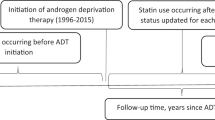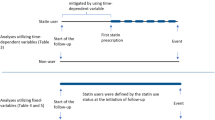Abstract
Background:
Statins are associated with lower PSA levels. As PSA is the primary method for prostate cancer (PC) screening, this confounds any associations between statins and risk of being diagnosed with PC. Thus, we examined the association between statins and cancer and high-grade cancer in REDUCE, where biopsies were largely PSA-independent.
Methods:
Post-hoc secondary analysis of REDUCE, which was a prospective multinational randomized controlled trial of dutasteride vs placebo for 4 years among men aged 50–75 years with PSA of 2.5–10.0 ng ml−1 and a negative biopsy at baseline, and included PSA-independent biopsies mandated at 2- and 4-years. Analyses were limited to men who underwent at least one biopsy while under study (n=6729). The association between baseline statin use and risk of overall, high-grade (Gleason ⩾7) or low-grade (Gleason ⩽6) PC vs no cancer was examined using multinomial logistic regression adjusting for age, race, baseline PSA, prostate volume, rectal examination findings, body mass index (BMI), comorbidities, smoking, alcohol intake and treatment arm.
Results:
Of 6729 men who had at least one biopsy while on study, 1174 (17.5%) were taking a statin at baseline. Men taking statins were older, had lower PSA levels, higher BMI values and lower serum testosterone and dihydrotestosterone levels, though differences, were slight. Statin use was not associated with overall PC diagnosis (multivariable OR 1.05, 95% CI 0.89–1.24, P=0.54). When stratified by grade, statin use was not associated with low-grade (multivariable OR 1.03, 95% CI 0.85–1.25, P=0.75) or high-grade cancer (multivariable OR 1.11, 95% CI 0.85–1.45, P=0.46). The major limitation is the inclusion of only men with a negative baseline biopsy.
Conclusions:
Among men with a negative baseline biopsy and follow-up biopsies largely independent of PSA, statins were not associated with cancer or high-grade cancer.
This is a preview of subscription content, access via your institution
Access options
Subscribe to this journal
Receive 4 print issues and online access
$259.00 per year
only $64.75 per issue
Buy this article
- Purchase on Springer Link
- Instant access to full article PDF
Prices may be subject to local taxes which are calculated during checkout

Similar content being viewed by others
References
Hamilton RJ, Freedland SJ . Rationale for statins in the chemoprevention of prostate cancer. Curr Urol Rep 2008; 9: 189–196.
Crawford ED, Black L, Eaddy M, Kruep EJ . A retrospective analysis illustrating the substantial clinical and economic burden of prostate cancer. Prostate Cancer Prostatic Dis 2010; 13: 162–167.
Stokes ME, Black L, Benedict A, Roehrborn CG, Albertsen P . Long-term medical-care costs related to prostate cancer: estimates from linked SEER-Medicare data. Prostate Cancer Prostatic Dis 2010; 13: 278–284.
Platz EA, Leitzmann MF, Visvanathan K, Rimm EB, Stampfer MJ, Willett WC et al. Statin drugs and risk of advanced prostate cancer. J Natl Cancer Inst 2006; 98: 1819–1825.
Flick ED, Habel LA, Chan KA, Van Den Eeden SK, Quinn VP, Haque R et al. Statin use and risk of prostate cancer in the California Men’s health study cohort. Cancer Epidemiol Biomarkers Prev 2007; 16: 2218–2225.
Jacobs EJ, Rodriguez C, Bain EB, Wang Y, Thun MJ, Calle EE . Cholesterol-lowering drugs and advanced prostate cancer incidence in a large US cohort. Cancer Epidemiol Biomarkers Prev 2007; 16: 2213–2217.
Murtola TJ, Tammela TL, Lahtela J, Auvinen A . Cholesterol-lowering drugs and prostate cancer risk: a population-based case-control study. Cancer Epidemiol Biomarkers Prev 2007; 16: 2226–2232.
Murtola TJ, Tammela TL, Maattanen L, Huhtala H, Platz EA, Ala-Opas M et al. Prostate cancer and PSA among statin users in the Finnish prostate cancer screening trial. Int J Cancer 2010; 127: 1650–1659.
Breau RH, Karnes RJ, Jacobson DJ, McGree ME, Jacobsen SJ, Nehra A et al. The association between statin use and the diagnosis of prostate cancer in a population based cohort. J Urol 2010; 184: 494–499.
Farwell WR, D’Avolio LW, Scranton RE, Lawler EV, Gaziano JM . Statins and prostate cancer diagnosis and grade in a veterans population. J Natl Cancer Inst 2011; 103: 885–892.
Tan N, Klein EA, Li J, Moussa AS, Jones JS . Statin use and risk of prostate cancer in a population of men who underwent biopsy. J Urol 2011; 186: 86–90.
Hamilton RJ, Goldberg KC, Platz EA, Freedland SJ . The influence of statin medications on prostate-specific antigen levels. J Natl Cancer Inst 2008; 100: 1511–1518.
Mondul AM, Selvin E, De Marzo AM, Freedland SJ, Platz EA . Statin drugs, serum cholesterol, and prostate-specific antigen in the National Health and Nutrition Examination Survey 2001–2004. Cancer Causes Control 2010; 21: 671–678.
Chang SL, Harshman LC, Presti JC Jr. . Impact of common medications on serum total prostate-specific antigen levels: analysis of the National Health and Nutrition Examination Survey. J Clin Oncol 2010; 28: 3951–3957.
Andriole GL, Bostwick DG, Brawley OW, Gomella LG, Marberger M, Montorsi F et al. Effect of dutasteride on the risk of prostate cancer. N Engl J Med 2010; 362: 1192–1202.
Andriole GL, Bostwick D, Brawley OW, Gomella L, Marberger M, Montorsi F et al. The effect of dutasteride on the usefulness of prostate specific antigen for the diagnosis of high grade and clinically relevant prostate cancer in men with a previous negative biopsy: results from the REDUCE study. J Urol 2011; 185: 126–131.
Thomas JA 2nd, Gerber L, Moreira DM, Hamilton RJ, Banez LL, Castro-Santamaria R et al. Prostate cancer risk in men with prostate and breast cancer family history: results from the REDUCE study. J Intern Med 2012; 272: 85–92.
Agalliu I, Salinas CA, Hansten PD, Ostrander EA, Stanford JL . Statin use and risk of prostate cancer: results from a population-based epidemiologic study. Am J Epidemiol 2008; 168: 250–260.
Mostaghel EA, Solomon KR, Pelton K, Freeman MR, Montgomery RB . Impact of circulating cholesterol levels on growth and intratumoral androgen concentration of prostate tumors. PloS One 2012; 7: e30062.
Friis S, Poulsen AH, Johnsen SP, McLaughlin JK, Fryzek JP, Dalton SO et al. Cancer risk among statin users: a population-based cohort study. Int J Cancer 2005; 114: 643–647.
Blais L, Desgagne A, LeLorier J . 3-Hydroxy-3-methylglutaryl coenzyme A reductase inhibitors and the risk of cancer: a nested case-control study. Arch Intern Med 2000; 160: 2363–2368.
Coogan PF, Rosenberg L, Strom BL . Statin use and the risk of 10 cancers. Epidemiology 2007; 18: 213–219.
Kaye JA, Jick H . Statin use and cancer risk in the general practice research database. Br J Cancer 2004; 90: 635–637.
Baigent C, Keech A, Kearney PM, Blackwell L, Buck G, Pollicino C et al. Efficacy and safety of cholesterol-lowering treatment: prospective meta-analysis of data from 90,056 participants in 14 randomised trials of statins. Lancet 2005; 366: 1267–1278.
Dale KM, Coleman CI, Henyan NN, Kluger J, White CM . Statins and cancer risk: a meta-analysis. JAMA 2006; 295: 74–80.
Browning DR, Martin RM . Statins and risk of cancer: a systematic review and meta-analysis. Int J Cancer 2007; 120: 833–843.
Hamilton RJ, Banez LL, Aronson WJ, Terris MK, Platz EA, Kane CJ et al. Statin medication use and the risk of biochemical recurrence after radical prostatectomy: results from the Shared Equal Access Regional Cancer Hospital (SEARCH) database. Cancer 2010; 116: 3389–3398.
Hall SA, Page ST, Travison TG, Montgomery RB, Link CL, McKinlay JB . Do statins affect androgen levels in men? Results from the Boston area community health survey. Cancer Epidemiol Biomarkers Prev 2007; 16: 1587–1594.
Mondul AM, Selvin E, Rohrmann S, Menke A, Feinleib M, Kanarek N et al. Association of serum cholesterol and cholesterol-lowering drug use with serum sex steroid hormones in men in NHANES III. Cancer Causes Control 2010; 21: 1575–1583.
Gutt R, Tonlaar N, Kunnavakkam R, Karrison T, Weichselbaum RR, Liauw SL . Statin use and risk of prostate cancer recurrence in men treated with radiation therapy. J Clin Oncol 2010; 28: 2653–2659.
Ku JH, Jeong CW, Park YH, Cho MC, Kwak C, Kim HH . Relationship of statins to clinical presentation and biochemical outcomes after radical prostatectomy in Korean patients. Prostate Cancer Prostatic Dis 2011; 14: 63–68.
Acknowledgements
We wish to acknowledge the dedication of the patients, investigators, data and safety monitoring committee, steering committee and GSK in the initiation and conduct of the REDUCE study.
Role of the sponsor
The REDUCE study was sponsored by GlaxoSmithKline (GSK). Data were then transferred to Drs Freedland, Bañez, Moreira and Ms Gerber who formatted the data and conducted the analyses funded through an investigator-initiated grant from GSK to Dr Freedland. None of Dr Freedland’s salary was paid for by GSK. GSK had no role in analyzing these data or writing the manuscript. GSK did review the final version of the manuscript.
Author information
Authors and Affiliations
Corresponding author
Ethics declarations
Competing interests
Dr Freedland reports receiving consulting fees from Amgen, Bayer, Mitomics, Medivation, Dendreon and Janssen and lecture fees from AstraZeneca, Amgen and Janssen. Dr Bañez reports being an investigator for AstraZeneca. Dr Andriole reports receiving consulting or advisory fees from Aeterna Zentaris, Amgen, EMD Serono, Ferring Pharmaceuticals, GenProbe, GSK, Myriad Genetics, Nema Steba, Onconome and Veridex; Equity ownership/stock from Cambridge Endo, Envisioneering Medical and Viking Medical; Lecture fees from GSK. Dr Rittmaster reports being a past employee of GSK and having equity ownership/stock from GSK. He retired from GSK after the completion of the REDUCE Study, but before analysis and submission of this manuscript and currently has no affiliation. The remaining authors declare no conflict of interest.
Rights and permissions
About this article
Cite this article
Freedland, S., Hamilton, R., Gerber, L. et al. Statin use and risk of prostate cancer and high-grade prostate cancer: results from the REDUCE study. Prostate Cancer Prostatic Dis 16, 254–259 (2013). https://doi.org/10.1038/pcan.2013.10
Received:
Revised:
Accepted:
Published:
Issue Date:
DOI: https://doi.org/10.1038/pcan.2013.10
Keywords
This article is cited by
-
The role of metformin, statins and diet in men on active surveillance for prostate cancer
World Journal of Urology (2022)
-
Efficacy of plasma atherogenic index in predicting malignancy in the presence of Prostate Imaging–Reporting and Data System 3 (PI-RADS 3) prostate lesions
International Urology and Nephrology (2022)
-
Serum cholesterol and risk of high-grade prostate cancer: results from the REDUCE study
Prostate Cancer and Prostatic Diseases (2018)
-
The current evidence on statin use and prostate cancer prevention: are we there yet?
Nature Reviews Urology (2017)
-
LDL-lowering therapy and the risk of prostate cancer: a meta-analysis of 6 randomized controlled trials and 36 observational studies
Scientific Reports (2016)



